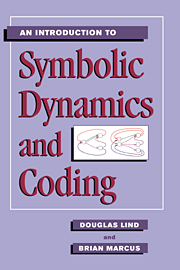Book contents
- Frontmatter
- Contents
- PREFACE
- CHAPTER 1 SHIFT SPACES
- CHAPTER 2 SHIFTS OF FINITE TYPE
- CHAPTER 3 SOFIC SHIFTS
- CHAPTER 4 ENTROPY
- CHAPTER 5 FINITE-STATE CODES
- CHAPTER 6 SHIFTS AS DYNAMICAL SYSTEMS
- CHAPTER 7 CONJUGACY
- CHAPTER 8 FINITE-TO-ONE CODES AND FINITE EQUIVALENCE
- CHAPTER 9 DEGREES OF CODES AND ALMOST CONJUGACY
- CHAPTER 10 EMBEDDINGS AND FACTOR CODES
- CHAPTER 11 REALIZATION
- CHAPTER 12 EQUAL ENTROPY FACTORS
- CHAPTER 13 GUIDE TO ADVANCED TOPICS
- BIBLIOGRAPHY
- NOTATION INDEX
- INDEX
CHAPTER 1 - SHIFT SPACES
Published online by Cambridge University Press: 30 November 2009
- Frontmatter
- Contents
- PREFACE
- CHAPTER 1 SHIFT SPACES
- CHAPTER 2 SHIFTS OF FINITE TYPE
- CHAPTER 3 SOFIC SHIFTS
- CHAPTER 4 ENTROPY
- CHAPTER 5 FINITE-STATE CODES
- CHAPTER 6 SHIFTS AS DYNAMICAL SYSTEMS
- CHAPTER 7 CONJUGACY
- CHAPTER 8 FINITE-TO-ONE CODES AND FINITE EQUIVALENCE
- CHAPTER 9 DEGREES OF CODES AND ALMOST CONJUGACY
- CHAPTER 10 EMBEDDINGS AND FACTOR CODES
- CHAPTER 11 REALIZATION
- CHAPTER 12 EQUAL ENTROPY FACTORS
- CHAPTER 13 GUIDE TO ADVANCED TOPICS
- BIBLIOGRAPHY
- NOTATION INDEX
- INDEX
Summary
Shift spaces are to symbolic dynamics what shapes like polygons and curves are to geometry. We begin by introducing these spaces, and describing a variety of examples to guide the reader's intuition. Later chapters will concentrate on special classes of shift spaces, much as geometry concentrates on triangles and circles. As the name might suggest, on each shift space there is a shift map from the space to itself. Together these form a “shift dynamical system.” Our main focus will be on such dynamical systems, their interactions, and their applications.
In addition to discussing shift spaces, this chapter also connects them with formal languages, gives several methods to construct new shift spaces from old, and introduces a type of mapping from one shift space to another called a sliding block code. In the last section, we introduce a special class of shift spaces and sliding block codes which are of interest in coding theory.
Full Shifts
Information is often represented as a sequence of discrete symbols drawn from a fixed finite set. This book, for example, is really a very long sequence of letters, punctuation, and other symbols from the typographer's usual stock. A real number is described by the infinite sequence of symbols in its decimal expansion. Computers store data as sequences of 0's and 1's. Compact audio disks use blocks of 0's and 1's, representing signal samples, to digitally record Beethoven symphonies.
- Type
- Chapter
- Information
- An Introduction to Symbolic Dynamics and Coding , pp. 1 - 27Publisher: Cambridge University PressPrint publication year: 1995



